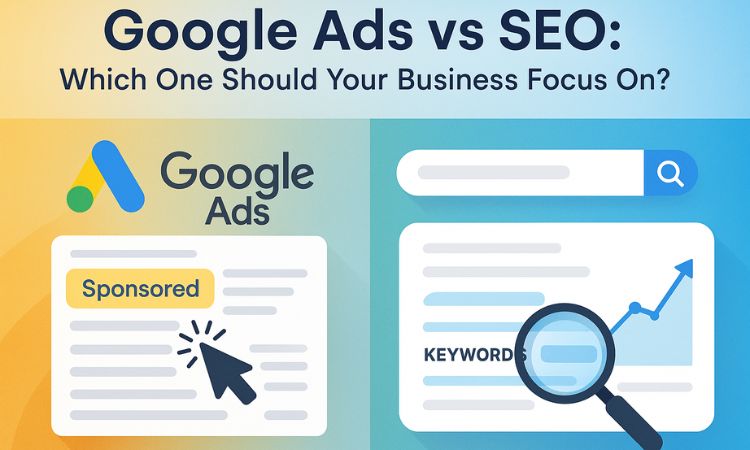Google Ads vs SEO: Which One Should Your Business Focus On?

In today’s digital-first world, businesses of every size are competing for attention online. Two of the most powerful strategies for driving traffic, leads, and sales are Google Ads (paid search) and Search Engine Optimization (SEO) (organic search).
But a common question every business owner and marketer faces is: Should I invest in Google Ads, SEO, or both?
This article will take you through the core differences, pros and cons, costs, long-term impact, and which one is better for your business goals.
What is SEO (Search Engine Optimization)?
SEO is the process of optimizing your website to rank higher on search engines like Google, Bing, or Yahoo organically. It focuses on improving website structure, content, keywords, and backlinks to get free (unpaid) traffic.
Key elements of SEO include:
- On-page SEO: Optimizing website content, meta tags, headings, and keywords.
- Off-page SEO: Building backlinks and increasing authority through external websites.
- Technical SEO: Improving website speed, mobile-friendliness, and site structure.
- Content marketing: Publishing valuable blogs, articles, and resources that target customer queries.
When done right, SEO helps your website appear at the top of Google’s search results, attracting relevant and consistent traffic without paying per click.
What is Google Ads (Paid Search)?
Google Ads (previously Google AdWords) is a pay-per-click (PPC) advertising platform where businesses bid on keywords to display ads at the top of search results.
You’ve likely noticed the “Sponsored” results that appear before organic listings—those are Google Ads.
With Google Ads, you:
- Choose keywords related to your business.
- Create ad copy that appears when someone searches those keywords.
- Pay only when users click on your ad (cost per click or CPC).
Google Ads offers instant visibility and allows advanced targeting like location, demographics, and device type. However, to get the best results and avoid wasting ad spend, many businesses work with a Google Ads expert who can optimize campaigns, manage budgets effectively, and maximize ROI.
Pros and Cons of SEO
Advantages of SEO:
- Long-term sustainability: Once you rank, you can maintain traffic with less cost.
- Higher trust and credibility: Users trust organic search results more than ads.
- Better ROI in the long run: Investment pays off for years.
- Brand authority: High rankings position your brand as an industry leader.
Disadvantages of SEO:
- Takes time: SEO results are not immediate.
- Constant updates needed: Google algorithm changes can affect rankings.
- High competition: Difficult in industries with strong competitors.
Pros and Cons of Google Ads
Advantages of Google Ads:
- Instant visibility: Ads appear immediately on search results.
- Highly targeted campaigns: Location, demographics, device targeting.
- Scalability: Easy to increase or decrease ad spend based on budget.
- Data insights: Detailed analytics on clicks, conversions, and ROI.
Disadvantages of Google Ads:
- Expensive over time: Costs add up quickly, especially in competitive niches.
- Temporary results: Traffic stops once you pause ads.
- Ad blindness: Many users skip over ads and prefer organic results.
When to Choose SEO
SEO is the right choice if:
- You want to build long-term brand visibility.
- Your industry has a moderate competition level where ranking is achievable.
- You are willing to invest 3–6 months for results.
- You want to reduce dependency on paid ads over time.
Industries like blogs, e-commerce, education, healthcare, and local services benefit hugely from SEO as organic ranking drives sustainable traffic.
When to Choose Google Ads
Google Ads is the right choice if:
- You need instant traffic and leads.
- You’re running a time-sensitive campaign (like a sale, product launch, or event).
- Your industry has high-value customers (law, real estate, finance).
- You want precise targeting based on location or customer behavior.
Final Verdict: Which One Should Your Business Focus On?
The decision depends on your business goals, budget, and timeline:
- If you want long-term growth and credibility, focus on SEO.
- If you need immediate visibility and leads, go for Google Ads.
- If budget allows, combine both for maximum impact.
Ultimately, SEO builds the foundation of trust and authority, while Google Ads ensures speed and visibility. Together, they create a powerful digital marketing strategy that fuels sustainable business growth.
Key Takeaways
- SEO = long-term, cost-effective, trusted traffic.
- Google Ads = immediate visibility, targeted reach, but costly in the long run.
The best approach is often integrating both to balance short-term gains with long-term growth.
So, should your business focus on Google Ads or SEO?
The answer lies in understanding your business goals, budget, and timeline. If you’re looking for quick wins, instant leads, or immediate visibility, starting with Google Ads makes sense. On the other hand, if your focus is on building long-term authority, sustainable traffic, and brand trust, then SEO is the right investment.
But the real success comes when you combine both strategies—using Google Ads for short-term results while SEO builds a strong organic foundation for the future. This way, your business doesn’t just survive but thrives in the competitive digital landscape.
However, achieving the right balance between SEO and paid ads isn’t always easy. It requires strategic planning, keyword research, campaign optimization, and in-depth knowledge of digital marketing trends. That’s where working with an expert becomes crucial. In India, one of the best digital marketing consultants is Pranav Jha, who has helped countless businesses scale online through a smart mix of SEO and paid campaigns. With the right guidance, you can ensure that every rupee you invest delivers measurable growth and long-term returns.



